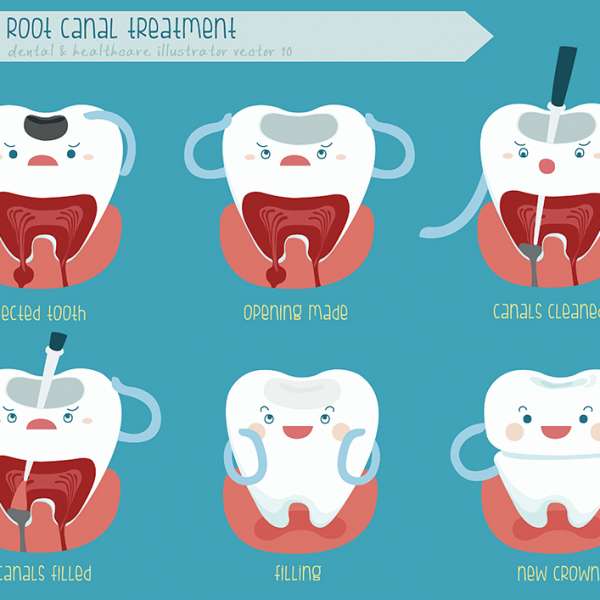What is a Root Canal Treatment?
Root canal treatment is a dental procedure to save an infected, dead tooth that would otherwise be removed by extraction. It removes the source of infection from within the pulp chamber of the tooth.
Once the diseased pulp tissue is removed, the empty chamber is cleaned and sealed with a material to prevent the infection from spreading.
Root canal treatment will prolong the usage of the dead tooth despite it has lose the vital pulp tissue as the surrounding bone and gum continue to hold the tooth as long as it is free of infection.
Why Does a Tooth Die and Why Should You Do Root Canal Treatment?


The pulp can sometimes die if the tooth is injured by tooth decay, trauma, gum disease or sometimes mysteriously without any obvious reason.
A dying tooth usually causes pain in the form of ache on biting or exposure to hot/cold food and drink. Sometimes, the tooth may die quietly without much disturbance.
A dead tooth is an a source of infection as the bacteria (germs) living inside the empty pulp chamber will cause irritation to the surrounding living tissue holding this dead tooth.
It also serves as a reservoir and a path for bacteria to spread to other areas of the jaw and face through the roots opening, leading to swelling and pain.
Root canal treatment saves teeth that would otherwise have been extracted. After the procedure, the tooth has no more vital tissue within the pulp chamber.
The surrounding living tissue like the gum and bone will continue to hold and support the dead tooth as long as it is free from infection.
You can use your root canal treated tooth like normal again. Most root canal treated tooth are more fragile so a crown is usually recommended to protect it from fracturing during function.
How Long Does a Root Canal Treatment Take?
Root canal treatment is a multiple visit procedure.
It ranges from 2-3 or even more visits depending on the position of the tooth and the complexity of the treatment. Each visit usually last about 30 minutes to 1 hour.
How Long Does the Root Canal Treated Tooth Last?
The tooth that has received root canal treatment can last for decades to a lifetime with proper care and maintenance.
Most root canal treated tooth are fragile, so a crown is highly recommended to prolong the life of the treated tooth.
Is a Root Canal Treatment Painful?
Root canal treatment is usually painless as local anaesthesia is applied to the area of the infected tooth before the starting of the procedure. The treated tooth may feel sensitive or tender for a few days as the surrounding vital tissue is healing.
Pain killer will be given to make this healing phase more comfortable.
However, if the pain persists or gets worse, contact our dentist immediately as there may be a risk of re-infection during or after the procedure.
FAQs
Can I use medisave to pay for Root Canal Treatment?
Root Canal Treatment is not eligible for Medisave claims.
Do I need to do a dental crown after Root Canal Treatment?
Any mentioned earlier that root canal treated tooth are more fragile than normal healthy tooth as the treatment hollow out the tooth and also the source of damage that kill the tooth in the first place like tooth decay and traumatic fracture. A crown is highly recommended to protect the weakened tooth as to prolong the life span of your root canal treated tooth. Not all root canal treated tooth needs a crown provided it is structurally sound and stroung. Our dentist will advise you if your case needs a crown.
What other options do I have besides Root Canal Treatment?
Unfortunately, the other alternative to treat an infected, dead tooth is extraction. Removing the painful tooth may solve your immediate pain but it also creates another problem of having a missing tooth. Prolonged un-replaced missing tooth can cause many other dental problems.
Although extraction may be a cheaper alternative to the cost of the root canal treatment and its subsequent crown, the treatment to replace the missing space with a bridge or dental implant may be more expensive in the long run. If you have a choice, keeping your own original tooth is always the best option. Do discuss with our dentist to weighs the pros and cons of your case before deciding on the fate of your dead tooth.
Are There Any Side Effects of Root Canal Treatment?
Success rate of root canal treatment is good, around 85%, but occasionally, small number of cases may get re-infected that may require a second root canal treatment or may be extracted if the tooth is fractured.
Can I eat after Root Canal Treatment?
During the period of having the root canal treatment, do eat on the other side as you do not want to fracture the weakened tooth before a crown is placed to protect the tooth. Once the crown is placed, then eating on the affected tooth can return to normal.
Why do I need to be referred to a root canal specialist (Endodontist)?
Our dentist can treat most of the tooth that requires root canal treatment, however in some cases, we do refer out your case to root canal specialist or Endodontist. These are dentists who undergo specialised training in this area and thus able to handle more complex cases to increase the success rate. We do usually refer out most of our molar cases (back teeth) because of its complexity due to the presence of multiple roots. We refer out your case because we value the improved success rate and your comfort over profit.

